Graduate Program
Understanding Child Mental Health in New Delhi’s Slums
Prerna Martin is a 2nd year Child Clinical student working with Shannon Dorsey. The Psychology Department asked Prerna to share her experiences conducting a research study in India this summer, while being supported by the Graduate School's Top Scholar recruitment award. Shannon Dorsey’s lab focuses on disseminating and implementing evidence-based practices for children and adolescents domestically and globally in low- and middle-income countries.
 |
| A typical Delhi slum and one of the study sites |
Growing up in India, I worked in urban slum communities from a young age. This involvement was through Asha, a non-profit organization founded by my mother that serves over half a million slum residents in New Delhi. Asha has a bottom-up multi-faceted approach to urban development, where trained community workers living in slums help design and lead programs in healthcare, education, empowerment, environmental improvement and financial inclusion. Over the last 30 years, Asha slums have undergone remarkable transformation in these areas – residents have access to healthcare services, morbidity and mortality from preventable diseases is low, most children go to school, living conditions have improved and community members are empowered to fight for their rights. Mental health, however, has been missing from this picture.
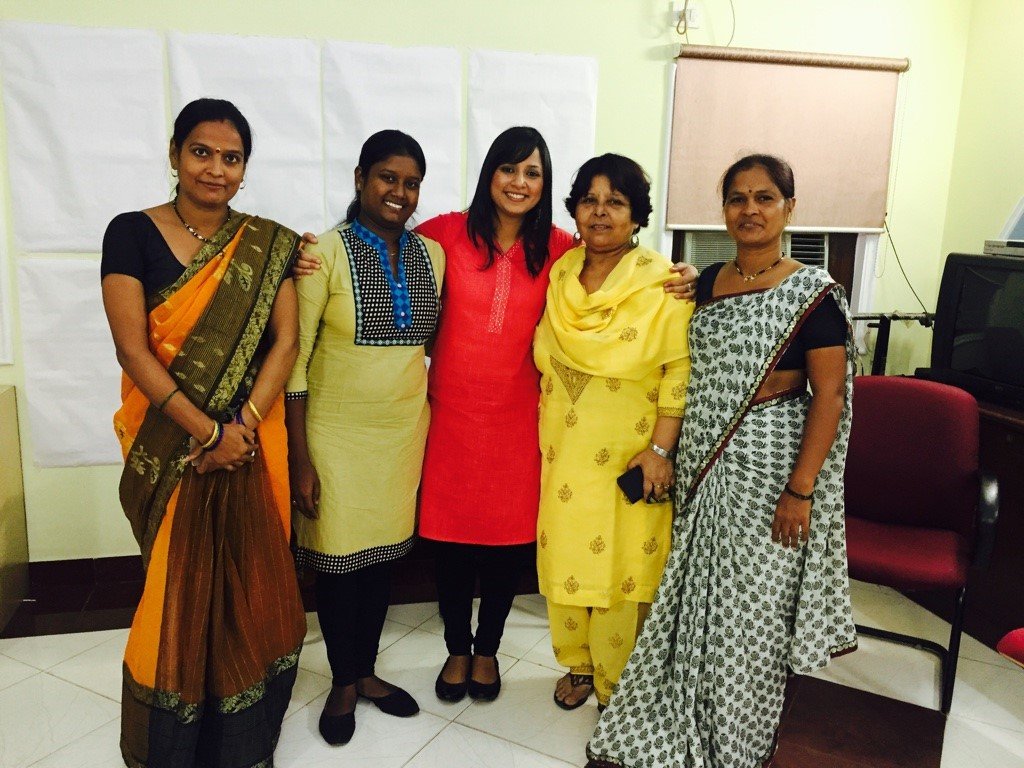 |
| Supervisors & project coordinators oversaw study activities at each site. Prerna in center. |
This summer, I had an opportunity to lead a research study that would inform the development of mental health services for children and adolescents in Delhi’s slums. Many chronic stressors from living in an urban slum such as overcrowding, residential insecurity, lack of clean water and sanitation, violence, abuse, discrimination, child labor and extreme poverty, place slum children at a high risk for developing mental disorders. Yet, no mental health services have been adapted to fit the needs of this population, and slum children remain one of the most under-represented groups in the global mental health agenda.
For this project, I used the Design, Implementation, Monitoring and Evaluation (DIME) method developed by Dr. Paul Bolton at John’s Hopkins University (JHU) to conduct a rapid needs assessment using qualitative interviews and focus groups. We wanted to understand how psychosocial problems of slum children are described and prioritized in this cultural context. At Asha, I trained 16 staff members in qualitative methods, who then interviewed over 120 children and adults living in two Delhi slums. The DIME method involves gathering lists and descriptions of problems identified by general community members, and then investigating potential mental health problems by interviewing key community informants. In order to capture local conceptualizations of mental illness, we conducted all the interviews and analyses in the local language, Hindi.
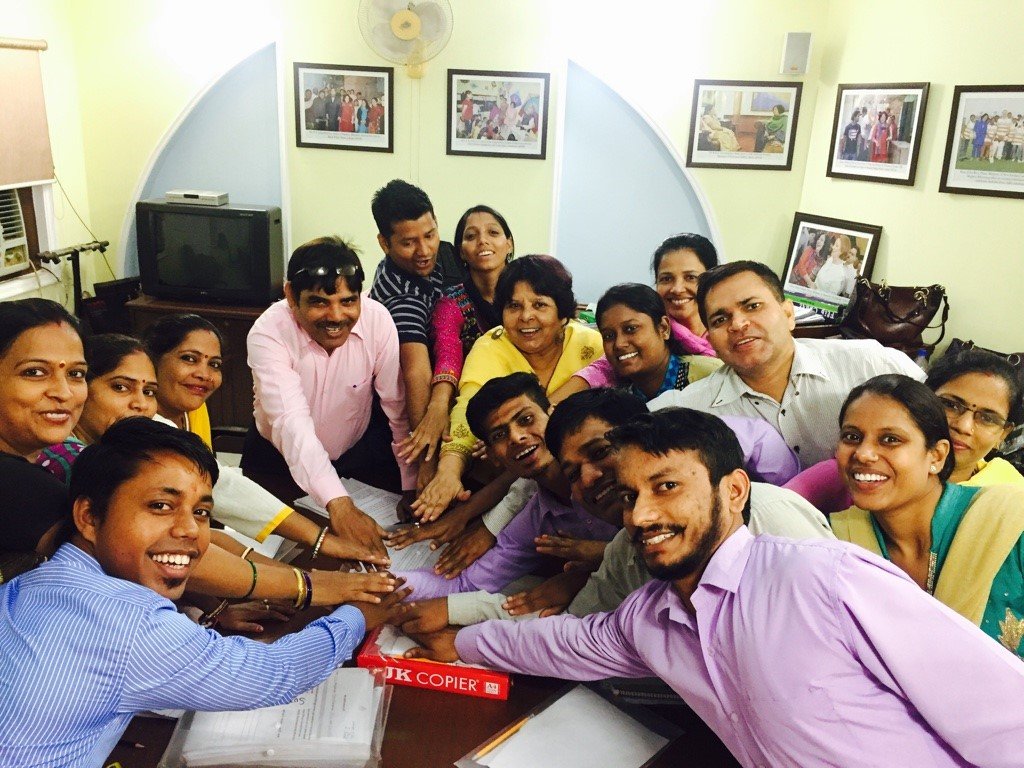 |
| Our team huddle every morning before starting study activities! |
For me, this experience was both inspiring and challenging. We learned so much about what mental health problems “look like” in urban slum children. While some of the underlying symptoms of internalizing and externalizing problems were similar to those we see in Western cultures, their descriptions and perceived causes differed. One of the biggest challenges was setting aside our preconceived notions of what mental illness should look like, and letting our understanding be truly informed by local perspectives. I was fortunate to work with a phenomenal team that was hard working, dedicated and really eager to learn new research skills. We started each day with a short affirmation exercise to verbally affirm each other’s strengths and unique qualities, which did wonders for team building and morale. It was exciting to see the interviewers grow and improve in their skills over the three weeks of the study. We encountered challenges at almost every step – from coordinating recruitment to translating study materials, making decisions during analyses to interviewer burnout. Through all of it, I was grateful to have so much support from Asha and my mentor and colleagues at UW and JHU. I left with a deeper appreciation of the unique challenges in global mental health research, and was also inspired by the potential for change.
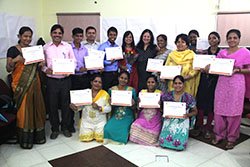 |
| Interviewers and supervisors receiving certificates in qualitative research at the end of the study. |
Looking forward, I am so excited about what we can offer kids and families living in Delhi slums. We are partnering with JHU and the Public Health Foundation of India to use this study’s data to inform measurement development and service delivery. Ultimately, my vision is to develop a culturally acceptable community-based mental health program that can be adapted for children living in slums worldwide. Thank you so much to the Dorsey Lab and UW Psychology Department for your support and encouragement towards pursuing the work that I love and extending our impact beyond Seattle – all the way to India!
Supplemental reading:
- Learn about the Dorsey Lab at UW.
- Learn about the NGO Asha in New Delhi.
- Learn about the DIME method.
NRSA Recipient Combines Technology and Counseling
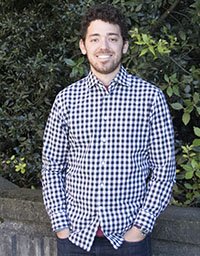 |
| Frank Schwebel |
Frank Schwebel (Adult Clinical graduate student working with Mary Larimer) is our latest student to receive predoctoral funding from NIH (NRSA, or National Research Service Award) for his research on expanding access of evidence-based practices to the public. The background of this research award was covered in a previous article. Learn more about Frank below!
Let's start with the basics, where are you from and where did you complete undergrad/masters?
I was born and raised in Tucson, Arizona and moved all of 90 minutes north to complete my undergraduate education at Arizona State University. I was extremely fortunate to work in the lab of the late Dr. Alex Zautra who played a huge role in helping me get into graduate school and who is greatly missed.
How did you wind up at UW/why did you apply here? What do you think about living in Seattle?
The UW Clinical Psychology Program has a fantastic reputation and upon interviewing here and meeting faculty and students I could easily see why. It was a no-brainer to accept the offer to enter the program despite Seattle’s reputation for less than stellar weather. As it turns out, the rain isn’t that bad and the city and surrounding areas have so much to offer that I can’t imagine a better place to live.
What is your research interest and how did you get into it (what inspires/motivates you)?
Broadly speaking, I am interested in behavior change, development of counseling protocols and programs, and applying technology to counseling. During my time here, I have focused on the treatment of adolescent substance use. Working to help teens with drug problems has been a passion of mine because of its prevalence and harmfulness, and because of the potential to remediate these problems at an early stage. Because teens are so attached to cell phones and computers, technology seems to offer an innovative new avenue for providing help.
How did you learn about your funding opportunity and tell us about the application/waiting process?
I think I first heard about the NRSA during our intro week “class.” Since then it had been a goal of mine to apply for and secure funding. This was my third time applying after receiving good (but not quite good enough for funding), scores before. This meant that I didn’t have to make many changes to my application but the waiting process was long (five months), and frustrating. It really helped that I was encouraged by my advisors to keep at it.
How did you feel when you learned that your application was accepted and that you will receive funding?
I was enormously excited when I saw my score this time around and very relieved to have secured funding for two more years in Seattle. I also was attending a conference in Berlin at the time and that only added to the excitement!
What is the name of your project and the funding source?
“Using supportive text messages to improve outcomes for adolescents in alcohol and other drug treatment.” The study was funded by the National Institute on Alcohol Abuse and Alcoholism (NIAAA).
Do you have any advice/tips/suggestions for others who may apply to this opportunity? About graduate study in general?
Stick with it. Applying for a grant is a long, confusing, and fickle process. If it is a good idea and something you believe in, keep trying. Also, ask for help, particularly from more experienced graduate students. You are probably not the first person from the department to apply for the grant and other students and advisors are valuable allies to have in this process.
What do you hope to accomplish with the funding and/or while in the UW Psychology graduate program?
I am excited to now have the time to complete this study that will serve as a strong foundation to continue doing research after receiving my Ph.D.
What do you like doing in your spare time?
I spend a good deal of my spare time playing soccer, working out, and tending to my P-Patch. I also am obsessed with the U-District Farmer’s Market and recently started doing yoga.
The last book and/or movie you saw and enjoyed?
“But What If We’re Wrong: Thinking About the Present As If It Were the Past” by Chuck Klosterman. An entertaining read that sparked plenty of conversation and debate with friends.
What you plan to do once you complete your Ph.D.?
Say “Trust me, I’m a doctor” a whole heck of a lot and then look for a faculty position that allows me to continue with this research!
Supplemental Reading:
Welcome to our 2016 Cohort!
This past September, 15 promising new graduate students began their doctoral studies in psychology at the University of Washington.
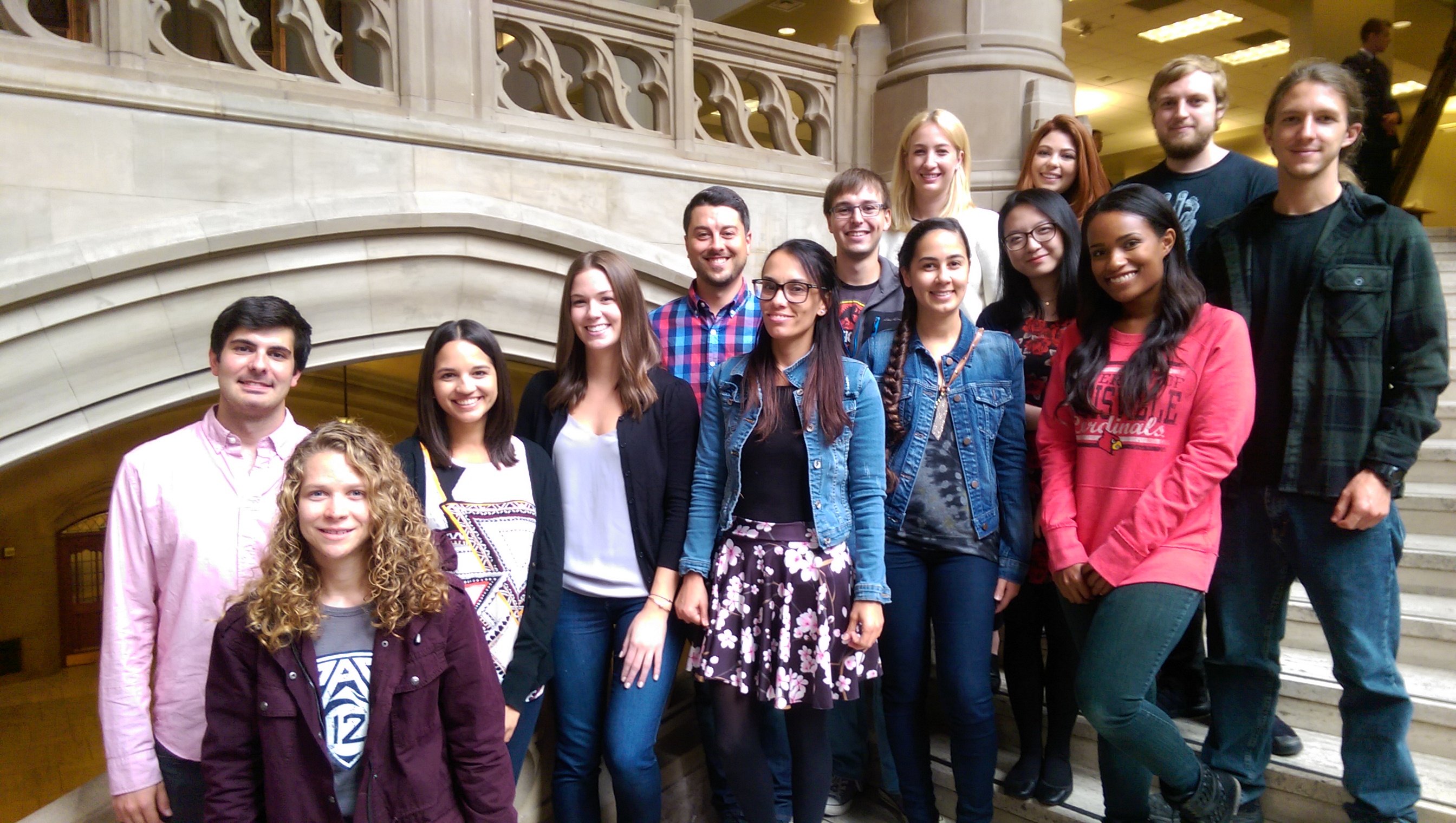 |
Incoming students have arrived at UW from across the continent. Several students received degrees from institutions on the East Coast, from North Carolina (Duke) to Quebec, Canada (McGill) and in between (Harvard, SUNY Albany, and Bowdoin). Three of our students attended the UW as undergraduates. Many students attended schools in California (Humboldt, USC, CSU Fullerton, and CSU Long Beach).
Several of our incoming students have already earned fellowships and awards. Two students received Psychology Department Scholar fellowships from the department. Five of our students either received Top Scholar Awards or GO-MAP Diversity Awards from the UW Graduate School during our competitive recruitment cycle.
New students attended a weeklong orientation before the official start of fall quarter, organized by an advanced graduate student who has been selected as the Department’s Lead TA. This year's Lead TA is Sarah Edmunds (Child Clinical with Wendy Stone). Orientation events included: the campus-wide TA/RA conference; a formal welcome from our Department Chair, Sheri Mizumori; course requirement planning sessions; and presentations on campus resources such as specialized library consulting, Hall Health,and the UW Counseling Center. Students reported that they learned most from and greatly enjoyed the panels of current graduate students providing perspectives and information on the first year experience, teaching, and research.
Supplemental Reading:
Updates from the Diversity Steering Committee
The Diversity Steering Committee (DSC) has new leadership for the 2016-2017 academic year. Starting this past summer, Frances Aunon (Adult Clinical Area with Jane Simoni) joined Arianne (Ari) Eason and Sarah Edmunds as DSC co-chairs. The three students will share coordination and leadership of the DSC’s many initiatives, along with this year’s faculty chair, Bill George. Future DSC co-chairs will serve for a two-year period such that each year there will be one seasoned and one new co-chair. We anticipate this will help maintain momentum on the DSC’s initiatives.
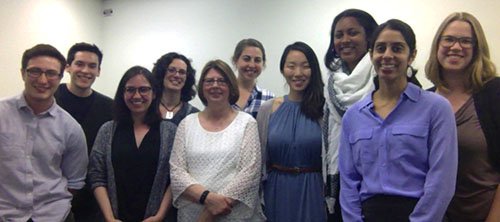 |
This autumn quarter, with an eye toward encouraging new ideas and gaining new perspectives, the DSC welcomed many new graduate student members. New members this year include: first year students Megan Ramaiya, Lily Durwood, Thea Weiss, Pete Rosencrans, Peter Zambetti, Yingxue Rao, Natasha Gulati, Catherine Dick, Jessica Burgeno, Miranda Petty, Dominic Sivitilli, Madelaine Keim, and Trent DesChamps, as well as fourth year student Saethra Fritscher. Welcome!
At our first meeting of the year, we will share the results of our biennial department-wide graduate student survey on diversity-related experiences. Sixty-nine (out of 104) graduate students from all areas in psychology participated in the study which provides an excellent representation of the Department. Data from this survey will generate discussion regarding how to best address diversity-related concerns in the Department, and contribute to the discussion of the DSC’s priorities and initiatives for the upcoming year.
The DSC looks forward to supporting graduate students in exploring diversity science in their coursework, research, teaching, and other domains of engagement within and outside of the UW. Please contact us at psychdsc@uw.edu for more information.
Supplemental Reading:
Graduate Student Accomplishments
Spring 2016
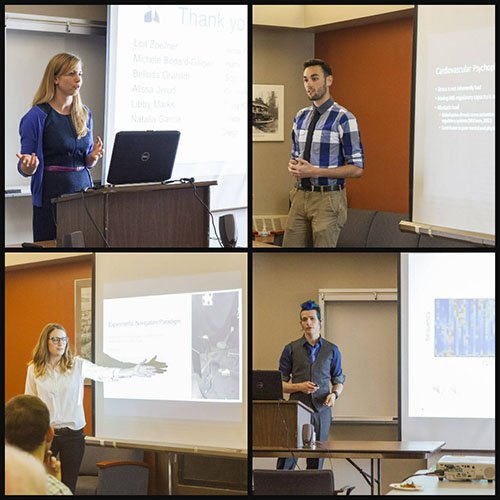 |
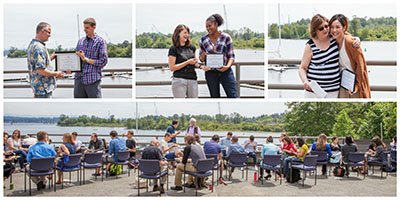 |
Our 45th Annual Psychology Research Festival was held at the Waterfront Activities Center near Husky Stadium on Wednesday, June 1, 2016. We had 17 speakers present their first- and second-year research projects. Following the presentations we enjoyed lunch on the sunny patio followed by an awards ceremony recognizing individuals in our Department for their contributions and excellence.
The 2016 Distinguished Teaching Award for Graduate Students was awarded to Brianna Yamasaki (Cognition and Perception Area with Chantel Prat). Brianna has TA'd for a number of undergraduate psychology courses, such as Introductory Psychology, Statistics, Child Development, Abnormal Psychology, and the Psychobiology of Women. Last summer, Brianna independently developed and taught a course in Cognitive Neuroscience. Around that same time, Brianna received word that she had been awarded a GO-MAP Dissertation Stroum Fellowship which will support her final year of studies. While we will miss having her in our TA pool, this fellowship will enable her to concentrate her efforts on her dissertation and complete the Ph.D. program during the 2016-17 academic year.
Joyce Yang (Adult Clinical with Jane Simoni) was our 2016 Department Service Award recipient for all her long-term involvement with the Diversity Steering Committee, her commitment to mentoring junior students, and her active participation in Department directed activities in the greater Seattle community.
Each year, graduate students recognize a fellow student for his/her contributions to the program with the Graduate Student Service Award. For 2016, three students were selected for this honor--Joyce Yang (Adult Clinical Area with Jane Simoni), Arianne Eason (Social Psychology and Personality and Developmental Areas with Cheryl Kaiser and Jessica Sommerville), and Sarah Edmunds (Child Clinical Area with Wendy Stone).
The awards concluded with the presentation of the Davida Teller Distinguished Faculty Award in Psychology. The recipient of this award is a faculty member in the Psychology Department who graduate students recognize as an outstanding mentor and advisor. The 2016 Davida Teller Award went to Brian Flaherty (Quantitative).
Charlotte Heleniak and Hilary Lambert (both from the Child Clinical Area with Katie McLaughlin) won poster awards at the 2016 Association for Psychological Science meeting in Chicago.
In Spring 2016, many students completed major milestones in the graduate program!
Three students completed Master's degrees (and now continue to the Ph.D.): Elizabeth Ake (Developmental Area with Kristina Olson/Jessica Sommerville), Matthew Enkema (Adult Clinical Area with Mary Larimer), and Ashley Ruba (Developmental Area with Betty Repacholi).
Several students passed their general exams and advanced to candidacy for the Ph.D.: Jose Ceballos (Cognition and Perception Area with Chantel Prat), Arianne Eason (Social Psychology and Personality and Developmental Area with Cheryl Kaiser and Jessica Sommerville), Charlotte Heleniak (Child Clinical Area with Katie McLaughlin), Mi-Seon Kong (Behavioral Neuroscience Area with Jeansok Kim), Lindsey Nietmann (Animal Behavior Area with Renee Ha), Joris Vincent (Cognition and Perception Area with Steve Buck), and Chelsey Wilks (Adult Clinical Area with Marsha Linehan).
We saw three students defend their dissertations and graduate with a Ph.D.: Ashwin Bhandiwad (Animal Behavior Area with Joseph Sisneros), Blake Pellman (Behavioral Neuroscience Area with Jeansok Kim), and Kayla Upshaw (Developmental Area with Jessica Sommerville). These recent graduates can be found working at the National Institutes of Health (NIH) in Washington, DC, or in a technology company near Seattle.
Graduates from our program over the past year are eligible to participate in our Department Hooding Ceremony which is an intimate event that enables family, friends, and other guests to recognize each individual Ph.D. graduate before they go off into the real world. This year we had ten graduates walk in our ceremony and be hooded by their advisors.
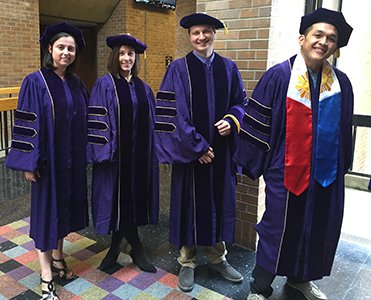 |
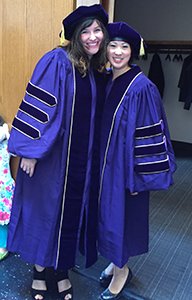 |
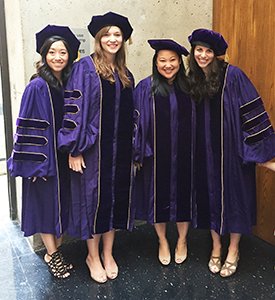 |
Summer 2016
While summer quarter is the quietest time of year, our students remained busy and have these accomplishments to note.
Karen Chang (Social Psychology and Personality Area with Yuichi Shoda) and Colleen Harker (Child Clinical Area with Wendy Stone), both completed their general exams and have advanced to candidacy for the Ph.D.
Three students completed an optional MS degree: Trevor Coyle (Adult Clinical Area with Marsha Linehan), Lizzy Karp (Child Clinical Area with Wendy Stone), and Adam Kuczynski (Adult Clinical Area with Robert Kohlenberg).
Nine students graduated with summer Ph.D.s. Laura Brady (Social Psychology and Personality Area with Yuichi Shoda), Jessica Chen (Adult Clinical Area with Ronald Smith), Hollie Granato (Adult Clinical Area with William George), Alissa Jerud (Adult Clinical Area with Lori Zoellner), Joy Kawamura (Child Clinical Area with Lynn Fainsilber Katz), Lyndsey Moran (Child Clinical Area with Liliana Lengua), Karen Pang (Child Clinical Area with Elizabeth McCauley of Seattle Children's Hospital and Lynn Fainsilber Katz), Andy Paves (Adult Clinical Area with Mary Larimer), and Stephanie Thompson (Child Clinical Area with Liliana Lengua). Our graduates can be found in post-doctoral fellowship positions across the United States and locally, along with a few in the technology industry.
Autumn 2016
Vasundhara Sridharan (Social Psychology and Personality Area with Yuicha Shoda) was one of the recipients of the inaugural Hutch United fellowships. This fellowship supports her research on tobacco addiction.
James Rae (Social Psychology and Personality Area with Kristina Olson) received the Society for Personality and Social Psychology (SPSP) Student Publication Award for his paper Exposure to Racial Out-Groups and Implicit Race Bias in the United States. Co-authors are Anna Newheiser (former UW postdoc) and Kristina Olson. The paper was published in Social and Personality Psychological Science.
The start of the school year continued to yield great news as three graduate students were selected to receive research fellowships. Sarah Edmunds (Child Clinical Area with Wendy Stone), Matthew Enkema (Adult Clinical Area with Mary Larimer), and Frank Schwebel (Adult Clinical Area with Mary Larimer). Check out Frank's research spotlight in our Graduate section.
Alicia Yiqin Shen (Social Psychology and Personality Area with Yuichi Shoda), participated in the eScience Institute Data Science for Social Good summer program. The project she worked on with her fellow colleagues (analysing data from Orca bus passes for the City of Seattle), was featured in the Seattle Times and GeekWire.
Check back with us in the summer for more accomplishments from our graduate students. Have a wonderful new year!